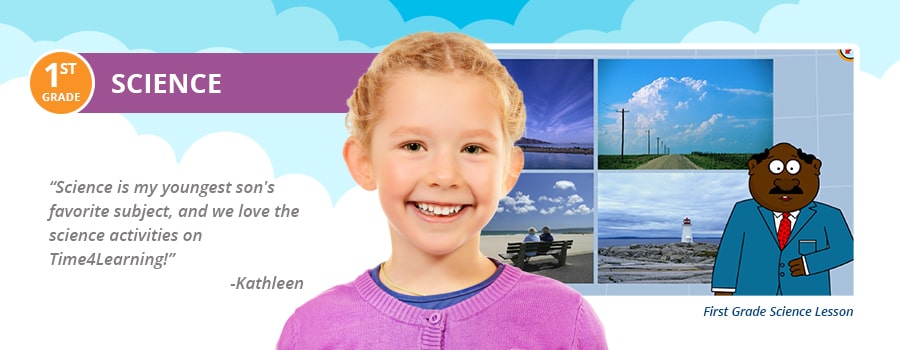First Grade Science Homeschool Curriculum
Children have an innate curiosity about the world around them. From the moment they can crawl and communicate, they begin to use their five senses to explore everything around them as they ask questions to learn more. In a way, children are natural born scientists.
A first grade science curriculum should quench that thirst for knowledge as students learn foundational science skills, take part in hands-on activities, and make real world connections. Introducing students to science during the early elementary years helps prepare them for more advanced science concepts that they will learn in the years to follow.
What Concepts Do You Teach in First Grade Science?
First graders should be learning fundamentals skills in topics like physical science, life science, and Earth science. Students should also learn the importance of observation, note taking, and communicating information, all essential skills that they will put to use as they continue to learn more advanced science concepts throughout the years.
Since science standards vary by state, be sure to inquire about what your state’s specific homeschool laws are as they pertain to first grade science. Generally, a first grade science curriculum should teach the following:
- Life science (plants, animals, habitats)
- Classification of animals and different animal habitats
- Distinguishing between living and nonliving things
- Earth and space science (solar system and beyond)
- States of matter (solid, liquid, gas)
- Type of light energy; the characteristic of sound energy (pitch, volume, etc.)
- Earth/space science including the water cycle and weather
- The different parts and functions of plants
First Grade Science Objectives
A first grade science curriculum should reteach and expand on what students learned in kindergarten, teach more advanced concepts on those topics, and introduce new material.
An effective first grade science curriculum will also give students the opportunity to make real life connections with what they are studying.
Below is a general overview of the science objectives for first grade.
- Distinguish between the states of matter and how they can change
- Ask scientific questions, observe using their senses, create hypothesis, draw conclusions, share data
- Distinguish between living and nonliving things
- Understand the water cycle, weather patterns, and seasons
- Identify the different parts and functions of plants
- Classify animals and the different habitats they live in
Time4Learning’s First Grade Science Lesson Plans
Scope & Sequence Copyright. © 2024 Edgenuity, Inc. All rights reserved.
Why Choose Time4Learning First Grade Science Homeschool Curriculum
The Time4Learning first grade science curriculum teaches students through interactive lessons and activities, printable worksheets, and more. With a simple-to-follow format that builds on previous material, students will be able to build a strong science foundation as they learn about the physical world around them, Earth, plant and animal life, the scientific process, and more.
First graders will learn about the water cycle, plants, insects and are introduced to some basic elements, helping them to understand the world around them better.
Time4Learning can help your student achieve all their first grade science goals with our flexible, student-paced curriculum, interactive lessons, and printable worksheets that make learning fun. In addition to providing an award-winning curriculum for students, Time4Learning also offers convenient tools for parents that help you save time and homeschool with confidence.
Learn more about our online first grade homeschool curriculum, designed to help your child learn and master their fundamental concepts.







